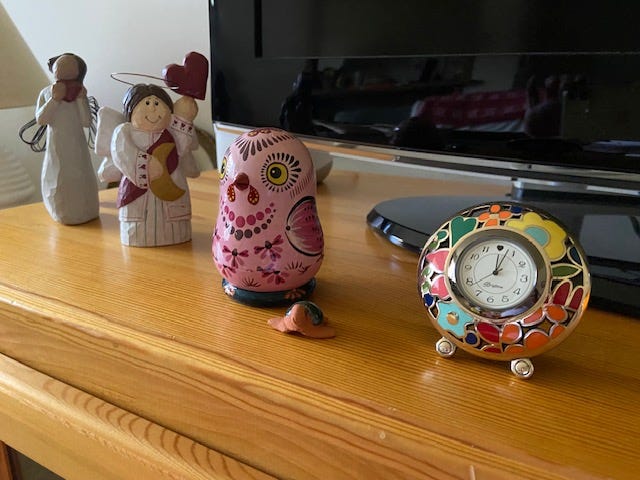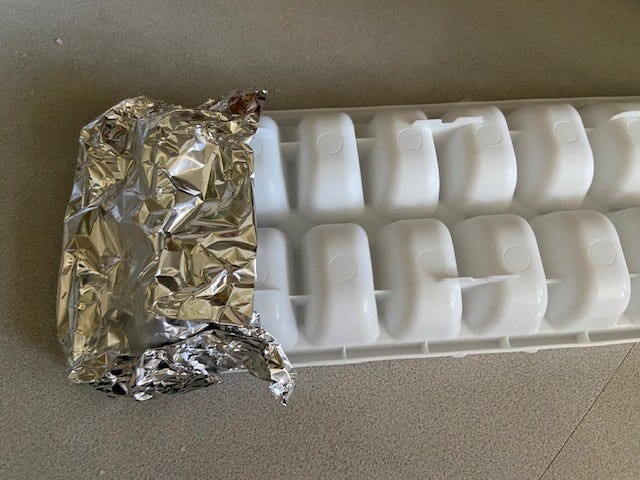My father began his final transition on June 30. After his home health aides gave him a bed bath, he settled comfortably into his pillows on his hospital bed. He thanked the aides, shared that he felt like a shiny new penny and closed his eyes to sleep. I could tell, though, that he wasn’t napping but instead was dying.
During his final days, I stayed with him in his independent living apartment with help and support from my sister, brother, niece and the facility’s home health aides. We dispensed his pain meds, including morphine, every four hours as directed by the hospice team.
When I wasn’t providing care, I was checking my bank account balance which glowed red because of my payments to ComEd and my landlord when I didn’t actually have the money for those payments. When I wan’t praying for my dad’s peace, I prayed that my bank didn’t return any of these payments, especially my rent check.
In truth, I was lucky. I knew a large payment was on its way which kept me hoping the bank would help me out for a few days. My luck turned a few hours before my dad died at 5 a.m. on July 2 when a nurse enrolled in my Certified Caregiving Consultant training. My red was short lived.
My anxiety about my overdrawn account while I cared for my dying dad made me wonder: How many family caregivers do some of the most important work of their lives while they can’t meet their own basic needs? How many other family caregivers experience that awful balance check — checking in on a dying caree while also checking their bank account? How many family caregivers hold their breathes because another shoe will drop — the bounced rent check, the returned car insurance payment?
Others looking in on our circumstance may think it’s easy to solve this problem: Get a job, take on gig work, ask for more help from others.
Caregiving Stress Makes All of Our Life Hard
As you know, it’s simply not that simple. The stress of our caregiving experience makes so much so hard for us. We make heart-breaking decisions, think through difficult-to-implement strategies, brainstorm solutions to our often impossible problems, and organize a complicated schedule. We often have little left to give outside of that caregiving experience.
We use so much energy during our incredibly complex caregiving experience that we literally are wiped out.
Tasks that others can complete easily might simply stump us. For years, my desk clock stayed stuck in time. When its battery died, I couldn’t figure out how to change the battery for the life of me. Two months after my dad died and 13 months after my mom died, I spent a few moments replacing the old battery with a new one. For years during my experience caring for my parents, I just couldn’t imagine how in the world I would change that battery. Sixty days after my caregiving experience ended, the clock ticked again.

For a few years, I had leaky ice cube trays. It never occurred to me to buy new trays. Instead, I added aluminum foil as a bottom cover to keep the water in. A few years later, during a trip to Walgreens when I ventured outside the pharmacy and the first aid and wound care aisle, I happened across the aisle with ice cube trays. I remember feeling both stunned and gleeful that we could buy new ice cube trays.


The Horrible Make-Do Habit
Our caregiving experience can teach us that We Must Make Do. We make do without enough help, time, resources, rest. Before we know it, we live a life of simply making do. I made do with a cute clock I love that stopped and with ice cube trays that leaked.
But we can’t continue to endure making do without enough money. During a caregiving experience, especially at a caree’s end of life, every family caregiver deserves to have enough.
Let’s do what we can to provide enough to family caregivers. Join me for a special advocacy campaign during November, which is National Family Caregivers Month, as we reach out to our local hospital leaders to ask for support in raising money to take care of our community’s largest group of health care providers: family caregivers.
A Little Makes a Difference
Between 2012 and 2016, I raised money to send $500 to as many family caregivers in need that I could. We sent money to Kristen, who bought food, shoes and new eye glasses. Receiving the money, she said, felt like we had sent her hope. We helped Amy, who cared for her parents, pay her bills. We helped other family caregivers pay for meds, respite and rent.
I saw the impact financial help makes. It lightens the load. It relieves some of the stress. It gives us time to relax. It makes space for us to think. Most important, it alleviates that horrible feeling of being alone during a terrible tragedy.
(Beginning in 2016, I raised money to send family caregivers to the National Caregiving Conference which I hosted in Chicago for four years.)
Let’s Advocate for Financial Support for Family Caregivers in our Communities
On November 2, visit our Caring Advocacy and Awareness Volunteers group in our online community, Caring Our Way. I’ll share with you:
A template of a letter you can send to the CEOs to non-profit hospitals and hospital foundations. In the letter, you will ask for help supporting family caregivers by encouraging the foundation to raise money to provide financial support.
A letter we’ll send to the American Hospital Association advocating for financial support for family caregivers. You can add your signature to the letter.
Family caregivers can no longer afford to make do. We want to guarantee that family caregivers have peace of mind and money in the bank as they manage the most important moments of their lives and their carees’ lives.
Resources
We also bring awareness for the need to support and help family caregivers during these special days in November:
Tackle the Tasks is November 25. We encourage others to help around the house of the family caregiver or caree.
Give to a Family Caregiver on #GivingTuesday (November 28). We encourage individuals to give a tax-free gift to a family caregiver.
Our Certified Caregiving Advocate training is free in November. Join me for our one-hour training on November 29 at 1 p.m. ET (Noon CT, 11 a.m. PT).
The Caring Awards
Submit a nomination for a caregiving book, advocate and TikTok creator on or before November 13.
Upcoming Events
Join me on November 10 at 2 p.m. ET for a free meeting to help you think through how to receive payment from your caree or other family members for providing care. Register for Planning for Getting Paid for Providing Care.
Event Archives
We posted our archives of these two events we recently hosted:
Planning Your Return to Work After a Career Break, which happened on October 20.
Fourth Annual Beginning Again Retreat, which took place on October 21.



